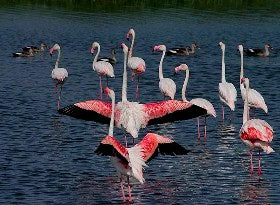
I find a session that piques my interest, with the bonus that the hall has a lightning-fast Internet connection and I can check my email while I wait for it to start. After the meeting comes to order, parliamentary procedure is under way, the minutiae of international negotiation begins, and delegations speak boldly of changing the word "identification" to "description." After a few minutes, I find even the fast Internet connection not enough to keep me there for the important but ponderous wordsmithing.
I have been asked to co-chair a World Bank side event on "Biodiversity as an Engine of Growth." It sounds great and I rely on my knowledgeable colleague, Anumpan Joshi, to brief me and give me the right messages to send. He does so brilliantly. My co-chair is to be a senior Indian professor, but he gets pulled at the last minute to something else and is replaced by the minister of environment from Bhutan. My first reaction is that this is an excellent coping action. His remarks later confirm that.
We hear a sharing of conservation and biodiversity cases that bring economics and benefit-sharing to the front of the debate, mainly the cases of India's tiger conservation program and its impact and potential for livelihood development for the poor. Next comes the Yosemite Park case in the United States, which argues so convincingly about how natural assets can be viewed as an economic engine for communities bordering the park. The numbers are enormous (around $800 million per year), combined with a jobs multiplier effect of over five for every federal job created. It goes over well with the crowd looking for evidence to sustain the theory of the importance of biodiversity and conservation for the region's poor. I certainly am convinced.
Next we hear about an initiative at Clemson University to create a network of global practitioners and a way to share best practices. It is getting ready to be rolled out and it generates excitement for its potential. We finally get to the Q and A (little time is left as always) and a speaker from Samoa expresses her concern that there is no female participant in the session and that these many poor people being discussed here have no one in the session to represent their views. We all agree that balance was lacking and we could have brought representatives to the session. I guess we are ingrained in some of our older patterns. But as every cloud has a silver lining; it leads to an idea to use oral history to capture and put that information on Clemson's website, to allow poor people's views to be heard and disseminated.
The session is over. People express their thanks. And now it all seems to come together as we see the fit of the Bank's initiatives on Natural Capital Accounting, bringing in economics to the biodiversity debate along with building new partnerships, especially with the private sector.
What felt foreign now feels like home as we keep moving toward our mission — a world free of poverty.


Join the Conversation